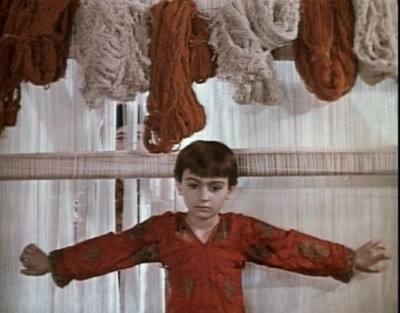
After being impressed with Sergei Parajanov’s Shadows of Forgotten Ancestors (1965), I was actually looking forward to his even more highly-regarded The Color of Pomegranates (1968) — a film that both baffled and angered Soviet censors. I have to say, I understand how they felt. If I was still in high school, I might have classified the film as “I didn’t understand it, so it must be art.” From a perspective long past high school, I can only say I didn’t understand it and I didn’t like it, but I don’t feel like I can say it’s bad. I admit I know nothing about the Armenian poet Sayat Nova from whose life and works the film is drawn and that may be a factor. (However, from what I can tell from the film itself, I doubt I’d respond to his works.) To say that this isn’t a traditional biopic is an understatement. The (thankfully) short film (78 minutes) is a series of tableaux illustrating — more or less — his poems and life. The film often resembles the old trick films of Georges Melies with characters popping in and out of the scenes observed by a nailed-down camera. A great many people appear to consider this beautiful and brimming with meaning. I found the images occasionally striking, and sometimes bizarre, but I never connected with them in any meaningful way. You may feel differently.




I really love this movie, but I won’t pretend I have any concise, orderly interpretive scheme for it. For me, it works as an abstracted theatrical representation of the sensations that inform Nova’s poetry (or at least the sensations with which the filmmakers populate his memories). I can’t help but think it’s the kind of biography a mystic poet would want.
I do think that there is a symbolic dimension to to the film — it’s hard not to read the bigendered muse as having some bearing on Parajanov’s sexuality — but I think a lot of elements work not because they mean anything in particular but because they have the ominous moment of symbols.
It can be an infuriating film, but I like the idea that at least one director in the history of international cinema was, for better or for worse, a kind of shaman.
In any case, I hope that you someday have the chance to review The Legend of Suram Fortress and Ashik Kerib, which are equally bizarre in execution but also much more linear.
For me, alas, it was pretty much just 78 minutes of pretentious tedium. But I generally have no use for non-narrative movies. For me, the acid test of a movie about an artist is whether or not it makes me interested in pursuing the artist’s life. I have no such interest in this Nova fellow.
For me, alas, it was pretty much just 78 minutes of pretentious tedium.
I tend to reserve the pretension label for films that try to intellectualize their subject matter — and fail. Whatever else it is, I don’t think Pomegranates is intellectual; its appeal for me is sensuous more than anything else.
But I generally have no use for non-narrative movies.
This is probably the single point about film on which we disagree most strongly — although you did like The Mirror, which I find interesting.
For me, the acid test of a movie about an artist is whether or not it makes me interested in pursuing the artistТs life.
That makes sense. My personal acid test, however, is whether it’s told in a manner that the artist would have appreciated. (On a related note: Mishima: A Life in Four Chapters.)
although you did like The Mirror, which I find interesting.
There is at least some kind of emotional resonance to that. This is just a series of tableaux that are meaningless to me and to which I cannot relate on any level — though I did laugh at sheep on the stairs.
My personal acid test, however, is whether it’s told in a manner that the artist would have appreciated.
Don’t you find it rather presumptive to conclude that for the artist?
DonТt you find it rather presumptive to conclude that for the artist?
Of course. The necessity of presumption is almost built into biographical films, I think. I just find the presumptions more interesting, and more evocative of the artistic life, when they’re stylized.
You misconstrue. I’m not saying it’s presumptuous for the filmmaker to make the film. I’m saying it’s presumptuous of you to conclude the artist would have appreciated it.
I am, by the way, the last person to argue against stylization. Whether I think it always works or is always created equally…
I’m afraid I’m with Mr. Moorhens on this one. I cannot begin to explain the film, but being mystified is not always a bad thing. Once I got into the rhythm of the piece, and yes it does have a rhythm, I was absorbed for its short 79 mins. I saw the Armenian version, which I hear is superior to the Russian version.
Warning: one can definitely not say no animals were harmed in the making of this film, with its scenes of traditional animal sacrifice. However I assume far worse goes on these days in modern abattoirs, and the cast did get their supper.